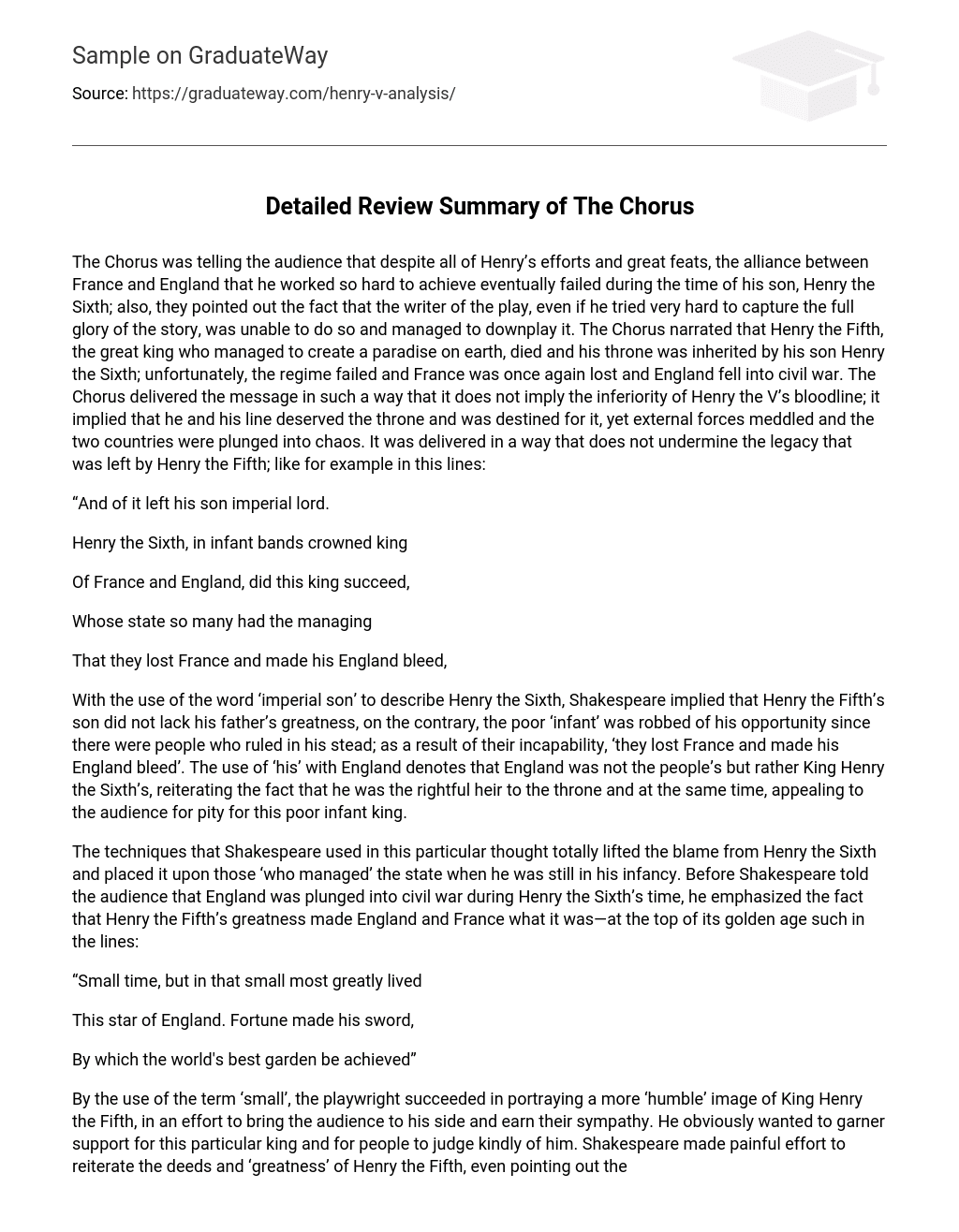The Chorus was telling the audience that despite all of Henry’s efforts and great feats, the alliance between France and England that he worked so hard to achieve eventually failed during the time of his son, Henry the Sixth; also, they pointed out the fact that the writer of the play, even if he tried very hard to capture the full glory of the story, was unable to do so and managed to downplay it. The Chorus narrated that Henry the Fifth, the great king who managed to create a paradise on earth, died and his throne was inherited by his son Henry the Sixth; unfortunately, the regime failed and France was once again lost and England fell into civil war. The Chorus delivered the message in such a way that it does not imply the inferiority of Henry the V’s bloodline; it implied that he and his line deserved the throne and was destined for it, yet external forces meddled and the two countries were plunged into chaos. It was delivered in a way that does not undermine the legacy that was left by Henry the Fifth; like for example in this lines:
“And of it left his son imperial lord.
Henry the Sixth, in infant bands crowned king
Of France and England, did this king succeed,
Whose state so many had the managing
That they lost France and made his England bleed,
With the use of the word ‘imperial son’ to describe Henry the Sixth, Shakespeare implied that Henry the Fifth’s son did not lack his father’s greatness, on the contrary, the poor ‘infant’ was robbed of his opportunity since there were people who ruled in his stead; as a result of their incapability, ‘they lost France and made his England bleed’. The use of ‘his’ with England denotes that England was not the people’s but rather King Henry the Sixth’s, reiterating the fact that he was the rightful heir to the throne and at the same time, appealing to the audience for pity for this poor infant king.
The techniques that Shakespeare used in this particular thought totally lifted the blame from Henry the Sixth and placed it upon those ‘who managed’ the state when he was still in his infancy. Before Shakespeare told the audience that England was plunged into civil war during Henry the Sixth’s time, he emphasized the fact that Henry the Fifth’s greatness made England and France what it was—at the top of its golden age such in the lines:
“Small time, but in that small most greatly lived
This star of England. Fortune made his sword,
By which the world’s best garden be achieved”
By the use of the term ‘small’, the playwright succeeded in portraying a more ‘humble’ image of King Henry the Fifth, in an effort to bring the audience to his side and earn their sympathy. He obviously wanted to garner support for this particular king and for people to judge kindly of him. Shakespeare made painful effort to reiterate the deeds and ‘greatness’ of Henry the Fifth, even pointing out the fact that his storytelling was inadequate in encapsulating his full greatness at the very beginning of the Chorus. Apparently, the playwright wanted to preserve the image of Henry the Fifth despite the failure that followed after his death. His efforts paid off since the delivery of those lines seem to paint a lighter side of Henry the Fifth and his ‘greatness’, for those who are naïve of history.
The introduction of the Chorus led to the assumption that the deeds that Henry the Fifth achieved were indeed glorious and celebrated the victories of the battles that transpired during his time. Yet, unfortunately, the claim to greatness is not believable and the Chorus intends to push the play into portraying Henry the Fifth as the greatest king that England ever had. It seemed to me that Shakespeare, like all of us, had been playing favorites and has a biased outlook on how he portrayed Henry the Fifth. It was more refined, toned down and apparently wiser as opposed to what actual history and accounts tell us. The speech seems to plead to the audience to better understand the reasons why England and France fell into hostilities a second time around. Also, it claims that the world of theater and the performance of actors are not accurate in their portrayals of this story—it claimed that it could not fully capture what happened and the full glory of Henry the Fifth’s victories and of Henry himself. The Chorus also implied that the fault was partly on the people who oversaw the affairs of the country while little Henry the Sixth was still an infant. The State performed poorly in Henry the Fifth’s absence and in the absence of a ‘great king’ such as Henry, the ‘garden’ that he built was destroyed by inferior men.





